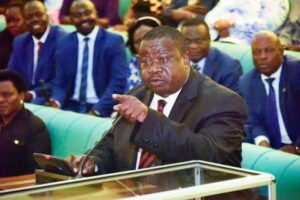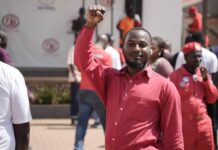- “You can’t detain someone for eight months without trial” — Gen. Kahinda Otafiire at Uganda Law Society memorial lecture
KAMPALA — In a frank, wide-ranging address delivered to the Uganda Law Society during the Sam Kalega Njuba memorial lecture on 19 September 2025, retired Major-General Kahinda Otafiire confronted one of the country’s most sensitive legal and political flashpoints: the detention without timely trial of high-profile opposition figures, notably Dr. Kizza Besigye. Otafiire — long a senior figure in the ruling movement and a veteran of Uganda’s armed struggle — told lawyers that the rule of law must be respected regardless of a suspect’s politics, and he startled parts of the audience with blunt reflections on mortality and the responsibility of the youth.

A clear demand for due process
Otafiire opened the substantive portion of his speech by addressing what he described as a legal and moral problem: prolonged detention without trial. Citing cases that have gripped public attention, he said it is unacceptable — and dangerous for the legitimacy of state institutions — to keep citizens in custody for months without arraignment or a clear judicial timetable. “You can’t detain someone for eight months without trial,” he declared, arguing that even where the state suspects wrongdoing the constitution and the principles of justice require that guilt be proved in open court or the accused be set free.
Otafiire did not name only one case; he used the controversy around Dr. Besigye — arrested and charged with serious offences late last year and the subject of court and public debate since — as the clearest example of why prompt, transparent judicial process matters. He urged that suspects should either be tried before a competent court or released, stressing that detention without trial hands the “court of public opinion” too much power and corrodes confidence in formal justice mechanisms.

Mortality, legacy and a message to young people
Midway through his address Otafiire shifted tone, delivering a passage that mixed stoicism and provocation. He reminded his legal audience that “everyone shall die” — a rhetorical device he used to put the present moment and political disputes in perspective. His point, he said, was to caution against allowing partisan bitterness to harden into policies that will be judged harshly by history.
Turning to the country’s youth — a recurrent theme for anyone speaking at a gathering of lawyers and civic leaders — Otafiire delivered a blunt, almost paternal message: young Ugandans have more years ahead of them than the older generation, and with that longevity comes an obligation to shape institutions rather than merely inherit grievances. He urged youth to use their remaining years to build durable systems of justice and governance rather than pursue short-term political spectacle. The remark was read by some in the audience as both encouragement and reproach: encouragement to engage constructively; reproach to older leaders who, in his view, sometimes cling to practices that damage long-term institutional health.

Reactions in the legal community and beyond
Otafiire’s call for due process was welcomed by sections of the Uganda Law Society and rights advocates who have consistently criticized renditions and prolonged detentions; they see his comments as a rare public alignment from within the ruling establishment with basic procedural safeguards. At the same time, some observers noted the rhetorical contradictions: Otafiire is both a member of the political-military generation that has governed Uganda for decades and now a vocal critic of particular tactics used in politically charged prosecutions.
Human rights groups and defence lawyers have previously documented concerns about the use of military tribunals, cross-border renditions, and extended remands — complaints that have fueled litigation and public campaigns. Otafiire’s insistence that suspects be tried promptly or set free bolsters those calls, but it also raises immediate questions about how the executive and judicial branches will respond to a prominent internal voice pressing for change.
What it might mean politically and legally
Practically, Otafiire’s speech puts pressure on several state actors. For the judiciary, it is a reminder of public expectations for speed, transparency and competence — especially when high-profile defendants are involved. For the executive and prosecutorial authorities, it is an admonition that prolonged detention without public, prompt judicial action weakens the government’s claim to be governed by law rather than expediency. Politically, a senior figure from the ruling generations speaking this way opens space for cross-camp calls for reform, but it does not guarantee any immediate change in practice.
Closing: legacy, law and the long view

- Otafiire closed his remarks by returning to the theme of legacy. Asserting that all leaders will be judged by history, he asked the legal profession — by training, oath and public trust — to insist on legal norms that outlast political moments. “We will all be gone,” he said; “what we leave behind are institutions.” For many in Kampala, the speech was striking precisely because it came from someone who has been at the centre of Uganda’s political order for decades. Whether it becomes a spur for reform or a well-phrased caution that fades with the news cycle will depend on follow-through from judges, lawyers, civil society and political leaders.








